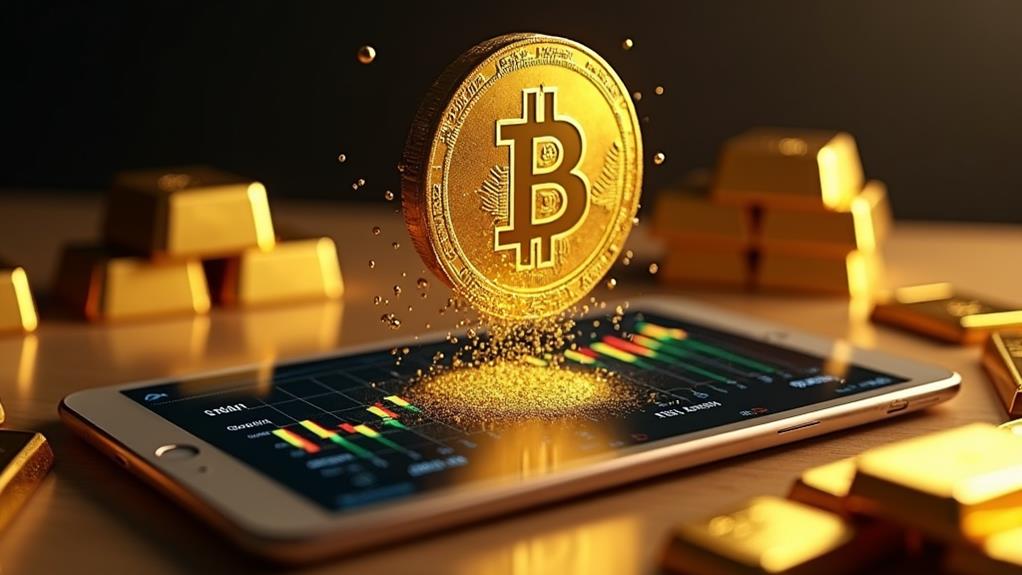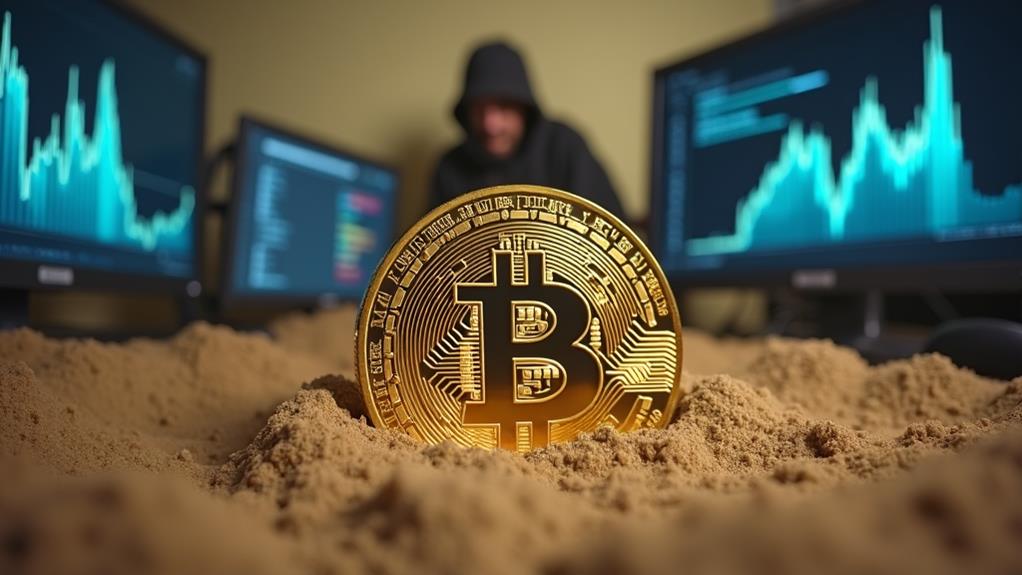In the rapidly evolving landscape of financial investments, digital gold has emerged as a modern alternative to traditional precious metal holdings. This innovative approach to gold ownership offers a unique set of advantages and challenges that investors must carefully consider. As the digital economy continues to expand, understanding the nuances of digital gold becomes increasingly important for those looking to diversify their portfolios. By examining the pros and cons of this digital asset, investors can make informed decisions about whether it aligns with their financial goals and risk tolerance. The following exploration will illuminate the essential factors to consider.
Key Insights
- Digital gold offers high liquidity, 24/7 accessibility, and low entry barriers for investors.
- It eliminates physical storage concerns but introduces cybersecurity risks and reliance on third-party custodians.
- Fractional ownership and precise investment amounts allow for greater flexibility and accessibility.
- Digital gold is subject to market volatility and potential regulatory uncertainties.
- It provides assured authenticity and standardized purity but lacks the tangibility of physical gold.
Understanding Digital Gold

Digital gold, similarly known as electronic gold or e-gold, represents a modern approach to investing in precious metals without the need for physical storage.
This innovative financial instrument operates through digital gold platforms, offering investors ease of access and convenience of trading.
Crucial advantages include:
- Low entry barriers, allowing small-scale investors to participate
- High liquidity, enabling quick buying and selling
- Transparency in pricing and transactions
- Fractional ownership possibilities
- No physical storage required, eliminating security concerns
However, potential investors should consider:
- Dependence on technology and internet connectivity
- Lack of tangible asset ownership
- Potential cybersecurity risks
As financial expert John Smith notes, "Digital gold combines the stability of precious metals with the efficiency of digital transactions, but investors must remain watchful about platform security and market volatility."
Advantages of Digital Gold
Exploring the advantages of digital gold uncovers a multitude of benefits for modern investors. This innovative form of investment offers several fundamental advantages over traditional gold ownership:
- Accessibility and convenience
- Improved security and lower costs
- Flexibility and real-time tracking
Digital gold provides 24/7 market availability, allowing investors to buy or sell at any time. Secure transactions and integration with digital wallets ensure the safety of investments.
Lower transaction costs and flexibility in investment amounts make it accessible to a wider range of investors. The elimination of physical handling reduces storage concerns and associated risks.
Real-time price tracking enables investors to make informed decisions quickly. Global accessibility allows for participation in the gold market from anywhere in the world.
These advantages make digital gold an attractive option for those seeking to diversify their investment portfolio with precious metals.
Drawbacks of Digital Gold

While digital gold offers various advantages, it likewise comes with notable drawbacks that investors should consider.
The inability to physically possess the gold, unlike traditional bullion, may concern those who value tangible assets.
In addition, digital gold platforms face potential cybersecurity risks, exposing investors to hacking and fraud threats.
Moreover, the regulatory landscape for digital gold remains uncertain in many jurisdictions, potentially affecting its long-term viability and legal status.
Limited Physical Possession
One significant drawback of digital gold is the lack of physical possession. Unlike traditional physical gold, investors in digital gold cannot hold their asset in their hands or store it in a personal vault. This absence of tangible ownership raises concerns for some investors who prefer the security of physically storing their gold.
When comparing digital gold vs physical gold, the inability to directly access and control the asset is an essential consideration.
The limited physical possession of digital gold presents several challenges:
- Reduced sense of ownership and control over the investment
- Dependence on third-party storage and security measures
- Potential vulnerability to cybersecurity threats or technological failures
While digital gold offers convenience and lower storage costs, the lack of physical possession may deter investors who value the tactile nature and perceived security of holding physical gold as an investment option.
Cybersecurity Risks
Cybersecurity risks pose a significant challenge for digital gold investments. As virtual gold exists in digital form, it becomes vulnerable to various online threats.
Digital gold platforms, like any other online platforms, can be targeted by hackers, potentially compromising investors' assets and personal information. The risk of cyberattacks, data breaches, and unauthorized access to digital gold accounts represents a significant concern for investors.
To mitigate these risks, digital gold investment companies employ advanced security measures, including encryption and multi-factor authentication. Nevertheless, the constantly changing nature of cyber threats means that no system is entirely foolproof.
Investors must remain watchful and take precautions to protect their digital assets, such as:
- Using strong, unique passwords
- Enabling two-factor authentication
- Regularly updating security settings
- Monitoring account activity for suspicious transactions
Ultimately, cybersecurity risks remain a fundamental aspect of digital gold investments that investors must carefully consider.
Regulatory Uncertainties
Another significant drawback of digital gold investments lies in the area of regulatory uncertainties. The digital gold market, often associated with cryptocurrency, lacks comprehensive regulatory oversight, potentially exposing investors to risks. This uncertainty can impact investment decisions and market stability.
Consider the following concerns:
- Evolving regulations may affect digital gold platforms' operations
- Unclear tax implications for digital gold investments
- Potential for sudden regulatory changes impacting investment value
As the digital investment landscape continues to develop, regulatory frameworks struggle to keep pace. This ambiguity can lead to additional costs and challenges for those who invest in digital gold.
Investors must carefully weigh these regulatory uncertainties against individual preferences and investment goals. While digital gold offers unique opportunities, the lack of established regulations presents hurdles that traditional gold investing may not face.
Thorough research and understanding of potential regulatory risks are essential before engaging in digital gold investments.
Security Concerns
Several security concerns surround digital gold investments, despite the technology's advanced encryption and blockchain features. Cybersecurity threats pose a significant risk to digital gold platforms, potentially compromising users' assets and personal information.
Hacking attempts, phishing scams, and malware attacks can target individual investors or entire gold platforms, leading to financial losses. Unlike physical gold, digital gold lacks tangible backing, raising concerns about its long-term stability and value retention.
The absence of comprehensive regulatory oversight in many jurisdictions further amplifies these security risks. Investors must carefully evaluate the advantages and disadvantages of including digital gold in their investment portfolio.
While digital gold offers convenience and accessibility, the potential security vulnerabilities may outweigh the benefits for risk-averse investors. Thorough research and due diligence are crucial when choosing a reputable platform to buy and sell digital gold.
Accessibility and Convenience

Digital gold offers unparalleled accessibility and convenience through easy online transactions and 24/7 buying flexibility.
Investors can purchase, sell, or trade digital gold from anywhere with an internet connection, eliminating the need for physical storage or transportation.
Nevertheless, this constant accessibility may lead to impulsive decisions, potentially increasing the risk of financial losses for inexperienced investors.
Easy Online Transactions
With digital gold, investors can enjoy unprecedented accessibility and convenience through easy online transactions. This modern approach to gold investment allows individuals to easily buy and invest in gold electronically, offering convenience and flexibility.
Gold through online platforms enables investors to:
- Purchase gold 24/7 from anywhere with internet access
- Avoid physical storage and security concerns
- Quickly liquidate holdings when needed
Digital gold offers a streamlined way to invest in gold, eliminating the need for physical storage and transportation. Investors can buy digital gold in small denominations, making it accessible to a wider range of individuals.
Nevertheless, it is essential to note that while digital gold offers convenience, it may not provide the same tangible security as physical gold. Investors should carefully consider their investment goals and risk tolerance before choosing digital gold as an investment option.
24/7 Buying Flexibility
Building upon the convenience of online transactions, digital gold platforms offer exceptional buying flexibility, enhancing accessibility for investors of all levels.
Unlike buying physical gold, digital gold can be bought in small quantities, with a low minimum investment requirement. This flexibility allows investors to start small and gradually increase their holdings.
Key advantages of digital gold's buying flexibility include:
- Fractional ownership: Purchase gold in fractions of a gram
- Low entry barrier: Invest with minimal capital
- Regular investments: Set up systematic investment plans
- 24/7 availability: Buy gold anytime, anywhere
As financial expert John Smith notes, "Digital gold provides a way to invest in gold that's more accessible than traditional methods."
Nevertheless, investors should be aware that while digital gold offers convenience, it may not provide the same tangible security as physical gold ownership.
Ownership and Custody Issues
While traditional gold ownership involves physical possession, digital gold introduces unique challenges related to ownership and custody. The concept of digital gold assets raises questions about the security and control of gold reserves. Unlike physical gold, digital gold is often stored and managed by third-party custodians, requiring trust in their systems and regulatory oversight.
Key considerations for digital gold ownership and custody include:
- Verification of actual gold reserves backing digital assets
- Security measures to protect against cyber threats and fraud
- Regulatory frameworks governing digital gold platforms and custodians
Investors must carefully evaluate the ownership structure and custody arrangements of digital gold providers. Understanding the legal and operational aspects of these platforms is vital for safeguarding investments.
While digital gold offers convenience, it likewise introduces intricacies in terms of ownership rights and custody responsibilities that differ significantly from traditional physical gold holdings.
Market Volatility

Market volatility is a significant factor to contemplate when evaluating digital gold as an investment option. The price of gold can fluctuate dramatically due to various economic factors, including currency devaluation and global market conditions.
While this volatility presents opportunities for profit, it likewise carries intrinsic risks. Investors should carefully weigh the pros and cons of investing in digital gold, taking into account its potential for portfolio diversification against the unpredictable nature of the gold market.
Digital gold purchases and gold ETFs may offer more liquidity than physical gold, allowing investors to respond quickly to market changes. Nevertheless, rapid price fluctuations can lead to substantial losses if not managed properly.
As with any investment, thorough research and understanding of market volatility are imperative before committing to digital gold investments.
Regulatory Landscape
The regulatory landscape surrounding digital gold remains complex and evolving. As an innovative investment product, digital gold faces varying levels of regulatory oversight across different jurisdictions. Investors should be aware of the potential risks and challenges associated with this relatively new form of buying gold.
Key considerations in the regulatory landscape include:
- Compliance with existing precious metal regulations
- Integration with traditional financial systems
- Consumer protection measures
Regulatory bodies are working to address frequently asked questions concerning digital gold and its relationship to sovereign gold bonds.
As the market develops, investors must stay informed about changes in regulations that may impact their investment goals.
While digital gold offers new opportunities, it's essential to understand the regulatory framework governing this asset class before incorporating it into a portfolio.
Comparison With Physical Gold

When comparing digital gold to physical gold, several important factors come into play.
Storage and security, liquidity and accessibility, and divisibility and purity are essential aspects to consider.
Understanding these differences can help investors make informed decisions about which form of gold best suits their needs and investment goals.
Storage and Security
Storage and security concerns differ significantly between digital and physical gold. Digital gold eliminates the need for physical storage, reducing costs and risks associated with storing gold bars or sovereign gold. Nevertheless, it introduces new security challenges related to cybersecurity and digital asset protection.
Key differences in storage and security:
- Physical gold requires secure vaults or safety deposit boxes, while digital gold is stored electronically.
- Digital gold is vulnerable to hacking and cyber threats, whereas physical gold faces risks of theft or damage.
- Storing physical gold incurs ongoing costs for insurance and security measures, while digital gold typically involves lower maintenance fees.
Investors must carefully consider their risk tolerance and storage preferences when choosing between digital and physical gold.
Although digital gold offers convenience and lower storage costs, some investors may prefer the tangibility and direct control of physical gold, despite the additional security measures required.
Liquidity and Accessibility
Liquidity and accessibility are crucial factors that differentiate digital gold from its physical counterpart. Digital gold offers investors a more convenient way of investing in gold, as they can buy or sell gold digitally with ease. This makes investing in gold more reachable to a broader range of investors, including those who may not have the means to purchase and store physical gold.
| Aspect | Digital Gold | Physical Gold |
|---|---|---|
| Liquidity | High | Lower |
| Accessibility | 24/7 online | Limited by location |
| Transaction Speed | Instant | Slower |
The high liquidity of digital gold allows investors to quickly convert their holdings into cash or other assets. Furthermore, the accessibility of digital platforms enables investors to manage their gold investments from anywhere with an internet connection. Nonetheless, it is vital to note that while digital gold offers these advantages, it still carries fundamental risks associated with online transactions and market fluctuations.
Divisibility and Purity
Two significant advantages of digital gold over physical gold are its superior divisibility and guaranteed purity.
Digital gold can be bought and sold in smaller quantities, allowing investors to buy gold for as low as 0.1 gram. This flexibility enables more precise portfolio allocation and easier entry for small investors.
Moreover, the purity of digital gold is assured, eliminating concerns about authenticity that can arise with physical gold.
Key benefits of digital gold's divisibility and purity:
- Precise investment: Investors can purchase exact amounts to match their budget or strategy.
- Fractional ownership: Smaller units make gold accessible to a wider range of investors.
- Guaranteed quality: Digital gold's purity is standardized and verified, reducing risks associated with counterfeits.
These features make digital gold an attractive option for investors seeking exposure to gold's value without the intricacies of physical ownership.
Future of Digital Gold
The future of digital gold appears increasingly promising as technological advancements and market trends continue to shape the financial landscape.
Digital gold offers several advantages over physical gold, including improved divisibility and ease of storage. As investors seek diversification options, this investment type has gained popularity in recent years.
Nevertheless, the future of gold in digital form faces challenges, particularly in terms of regulatory oversight. While digital gold provides convenience and accessibility, it may be subject to evolving financial regulations.
Experts suggest that:
- Digital gold could become more mainstream as technology improves
- Integration with blockchain may bolster security and transparency
- Increased adoption may lead to more standardized practices
As the financial sector evolves, digital gold is likely to play a significant role in portfolio diversification strategies.
Investors should stay informed about regulatory developments and carefully consider the risks and benefits associated with this emerging asset class.
My Final Thoughts
Digital gold stands as a double-edged sword in the investment landscape. While it offers a golden opportunity for accessibility and convenience, it likewise harbors potential pitfalls. The digital domain's volatility and security concerns cast shadows on its glittering promise. As regulations evolve and technology advances, the future of digital gold remains uncertain. Investors must carefully weigh the scales, balancing the allure of innovation against the time-tested stability of traditional gold investments, to steer through this modern financial frontier.







